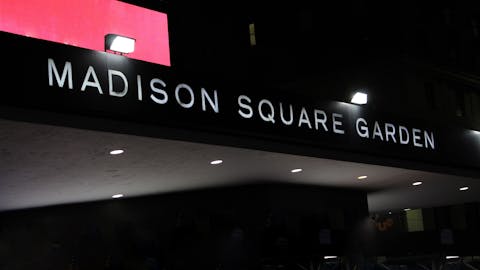So, we’re focused on maximizing those and ensuring we find the right partners for those premium assets. Our premium hospitality continues to be in high demand, and we’re going to benefit this year from the addition of two new event level suites of The Garden, continuing to build on both our renewals and our new sales momentum. And we continue to focus on fan engagement. We work on a number of initiatives to increase our direct relationships with our fans, and that’s a priority for us in FY ’24, delivering compelling social content, which is good for our fans, drives our sponsorship business, and we’ll continue to innovate in some of the merchandise and other fan offerings and events that we can. So, we see a number of significant growth opportunities ahead and it’s broad-based across the whole business.
Victoria Mink: Ben, good morning. It’s Victoria. So — sure, I’m happy to provide a little bit more color. I mean, we’re not providing any specific AOI guidance, but just a little more color. So first, just taking a step back, right, as you did hear me say in my prepared remarks in terms of fiscal ’24, and we expect to again deliver robust revenue growth on a year-over-year basis. But in addition to those higher revenues, we do also expect our AOI results for the year, to reflect the impact of higher team operation expenses. And that’s going to include, number one, the impact of our current rosters. And it’s also going to be impacted by higher revenue sharing expense, which includes lower projected luxury tax receipts. And I guess just also worth noting that for the upcoming season, the NBA salary cap has increased from $123.7 million to $136 million. And on the NHL side, it’s a modest increase, $83.5 million to $82.5 million.
Ben Swinburne: Thank you, both.
Operator: And your next question comes from the line of Devin Brisco from Wolfe Research. Your line is open.
Devin Brisco: Thanks. I have a question on sponsorships. ESPN’s licensing deal with PENN Entertainment to create ESPN BET earlier this month is another proof point that sports betting is still in very early innings. Could you talk about how meaningful that category is as a proportion of your sponsorship dollars and how fast or how big you think that category could be over time?
David Hopkinson: Yes, absolutely. Thanks, Devin. You’re right. It’s early innings, as you said, but we’ve seen great momentum in our sponsorship business this past fiscal year. Overall, in fact, this was our best year yet in sponsorship revenue. I mentioned some of our significant new sales and renewals, Spectrum, Verizon, HUB, MSC Cruises. But this past year’s results also included the impact of our sports gaming partnerships. So, I won’t get into specifics, but what I can say is that sports betting is one of our largest revenue categories in marketing partnerships this year and was a big piece of what helps drive growth in fiscal 2023 to a new revenue record. We’ve got three great partners under long-term agreements. And as the landscape evolves, if New York State regulations around online sports gaming were to continue to evolve or other sports betting-related opportunities were to arise, whether that would be lowering the tax rate for operators or the opening of a downstate casino, we think these would only increase the revenue potential for us.
So we continue to see sports gaming as an important sponsorship category for us as we look ahead. And we’re pleased with the partnership we’ve established today.
Devin Brisco: Thanks. And I have a follow-up question on just how we should think about expense growth for 2024. The color on the salary cap increases was helpful. And I think the new NBA collective bargaining agreement comes into play this season. Could you talk just a little bit more about any impacts from that and how the growth in expenses this year for fiscal ’24 might compare versus historical growth?
Victoria Mink: Sure, Devin. So just a little bit more about in what I indicated earlier to Ben, right, that we are looking at higher operating expenses, again, the current rosters and then some of the lead related expenses being revenue-sharing expense and lower projected luxury tax receipts, and again, and then the increase in the NBA salary cap, and then the NHL cap going to $83.5 million. But just as it relates to the new collective bargaining agreement overall, we don’t expect — we’re not anticipating any material impact to our business.
Ari Danes: Thanks, Devin. Operator, we’ll take one last caller.
Operator: And your final question comes from the line of David Joyce from Seaport Research Partners. Your line is open.
David Joyce: Thank you. Two questions, if I could. First is on the playoff revenues. While you did have a couple of fewer home playoff games this quarter [Indiscernible] per playoff game revenue was up maybe 8.5%. Could you dive into that some more, perhaps [Indiscernible].
Ari Danes: Hey, David, it’s Ari. You’re breaking up a little bit. I think we got the gist of the question, though, you’re looking for a little bit more detail on playoff revenues for the quarter, Victoria?
Victoria Mink: Sure. Thanks. Hi, David. So as you know, playoffs can be a significant increment — significantly incremental to our business, depending on the length of the playoff run. So our playoff tickets are priced at a significant premium to our regular season games, F&B and merchandise per cap spending is typically well above the regular season averages. In this quarter, we hosted eight playoff games at The Garden, as compared to last year, which was 10 playoff home games. So as a result, our playoff-related revenues for the fourth quarter were $56.2 million as compared to $64.8 million in the prior-year period. So this is translating to roughly $7 million of revenue on a per game basis. In addition, approximately $4 million in per game direct operating expenses as well as some additional marketing and administrative costs that are incurred in connection to playoff participation.



